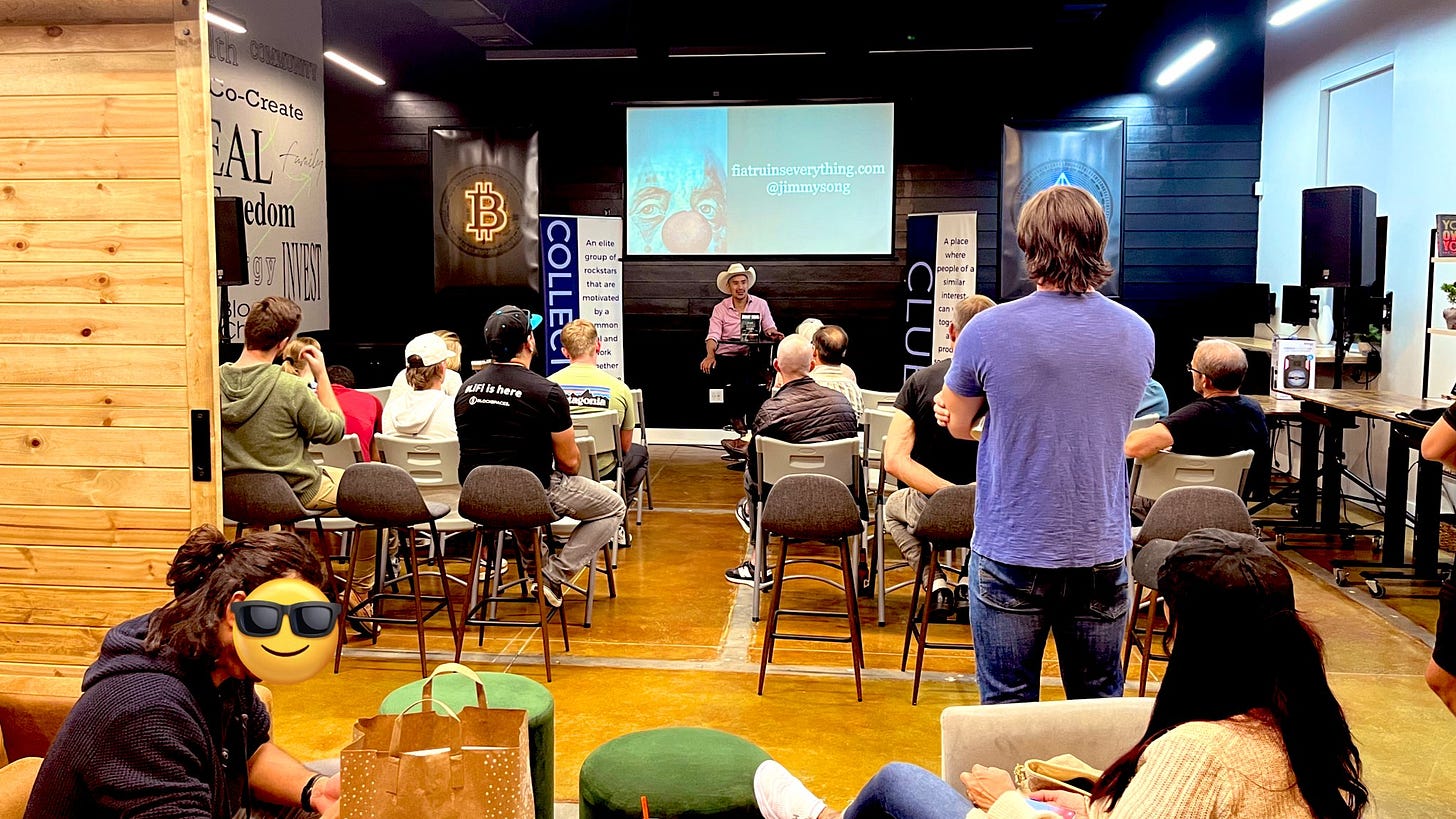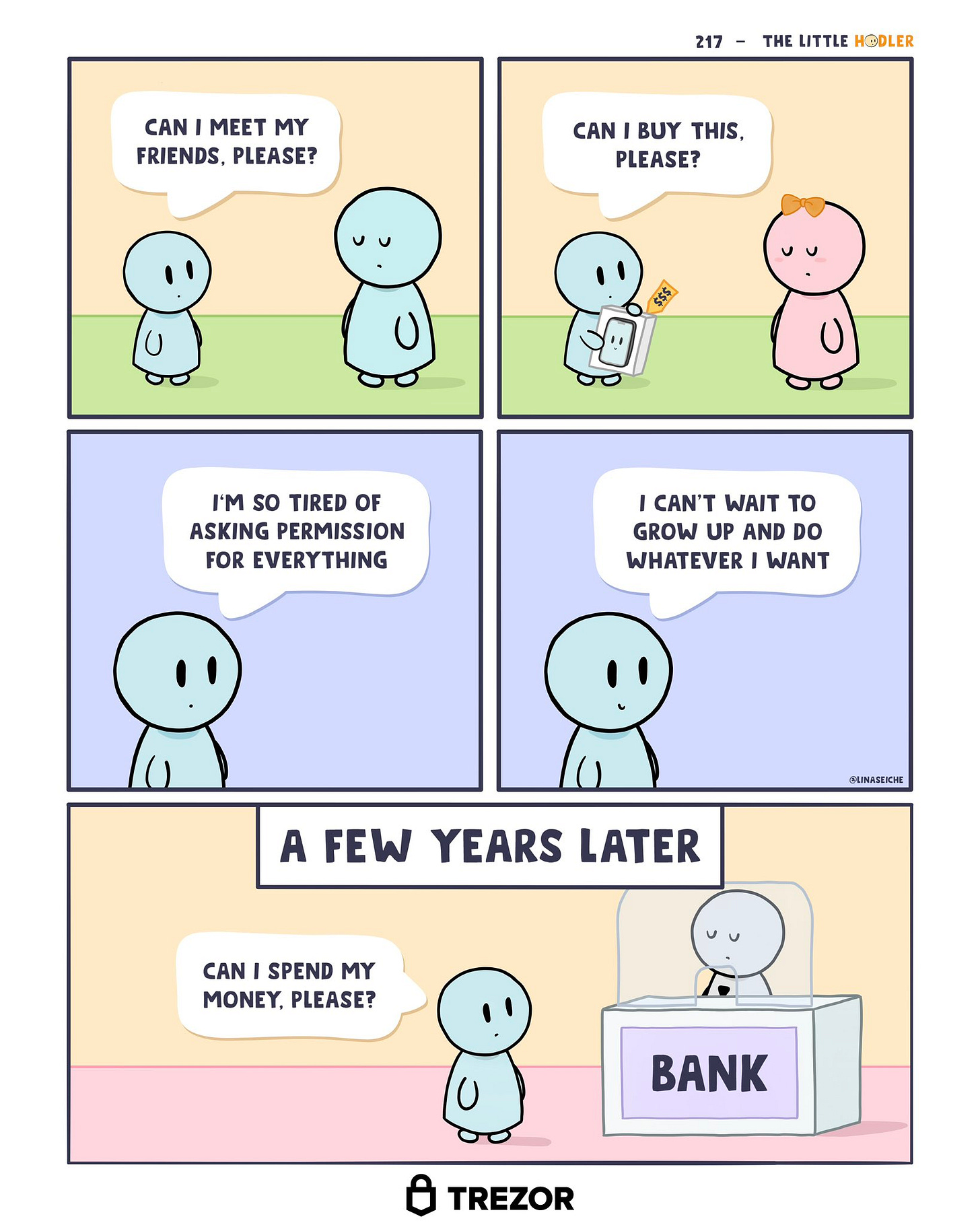Bitcoin Tech Talk #375
Interesting Stuff
The Plague of Bureaucrats - Locklin has a banger of a rant on how inefficient bureaucrats are ruining everything. The main idea in the post is that a significant number of jobs are really bureaucratic, such as computer programmers. He points out, for example, that Google employs 200,000 people, when it’s not that much better than when it employed a few hundred. The most interesting part of the analysis is the idea of bureaucratic class consciousness. As he points out, the policies and beliefs of the bureaucrat are to expand bureaucracies so their jobs are secure. It’s really a shame he doesn’t make the connection to fiat money creating this problem, but it’s a fun read.
AI Business Models - In the midst of the AI hype, Eric Hoel throws cold water on the entire business with his analysis about what AI is actually good at. The main argument of the article is that AI is the dataset and the AIs perform well where there is a large dataset. But these datasets are open, so there’s no advantage to any particular company because there’s no moat and no reason for people to pay much for it because it becomes commoditized very quickly. In other words, there’s no obvious way to make money off of this because it’s a natural race to the bottom.
Worshipping the NHS - The story itself is a tragic one about how doctors are now playing god with patient lives. Specifically a 6-month old with some problems that the doctors in the UK determined should not continue to get life-support. But the much more interesting question is about how much the Hypocratic Oath is being followed anymore, given the lack of a reverence for the sanctity of life. What I found especially disturbing was that the doctors in this case really wanted this kid to be off life support, despite the Italian government offering to support the child and pay for everything. Such are the tragedies of socialized medicine.
What I'm up to
State of Bitcoin Podcast - I went on this podcast to talk about altcoins vs. Bitcoin and the technical aspects of Bitcoin, starting with how it’s a computer science breakthrough. I talked about blockchain and how it’s really only useful for Bitcoin and also explaining a lot of L2 tech, including Lightning, Liquid and Fedi/Cashu. We talked also about the new narrative around this particular high fee environment and the nefariousness of CBDCs.
Future of Freedom Tech - This is a panel I moderated at Unconfiscatable about where Freedom tech is and where it’s going. We talked about the priorities these devs have and how they hope to keep the spirit of freedom alive. What struck me was how focused they were in providing tech that aligns with the values these developers hold. It’s definitely worth thinking about as we progress in creating an alternative to the centralized systems that we’ve gotten used to.
FROST/MuSig/Taproot Class - I’m stall taking signups for the 1-day Taproot class in Austin January 8th. This class will be in the style of my Programming Blockchain classes, which are based on coding the concepts as you learn them and with real transactions on testnet and signet. I already have around 10 people signed up. Spots are scarce, so apply today!
Nostr Note of the Week
What I’m Promoting
Unchained Capital is a sponsor of this newsletter. I am an advisor and proud to be a part of a company that’s enhancing security for Bitcoin holders. If you need multisig, collaborative custody or bitcoin native financial services, learn more here.
Bitcoin
Warnet - Most developers have a hard time trying to emulate what happens on the Bitcoin network as the topology can be almost anything. Warnet is here to help. You can create a different network topology and test various features based on these. This should be a really useful tool to determine whether features behave the way you expect, especially under adversarial scenarios (hence the name). Developers working on almost anything should have test suites that use this tool for various topologies that you expect.
BBQr - This is a new way to send a lot of data through an airgap, which notably is different than animated QR codes. On the one hand, it’s annoying that it’s a different standard, especially for multisig setups. On the other hand, different ways to do stuff is sorely needed to give people more options. This one is specific to CoinKite, and we’ll see if this standard gets any traction outside of their suite of devices.
Chaincode Developer Program - Chaincode has a new 3-month program to take you from developer to Bitcoin Open Source developer. They’ve done similar programs in the past, particularly with the Residency program, but this one seems much more focused on getting new Bitcoin developers into Open Source projects. This is an excellent program and largely free, so ambitious developers should apply.
Lightning
Non-custodial Mobile Challenges - Matt Corallo has a long post on the challenges of Lightning on mobile devices and they are not few. Among other things, you need sufficient liquidity, the ability for the mobile device to respond to payments without being explicitly opened and privacy around routing and block fetching. These are not small challenges, and solving them will require innovations. But to me, it’s a great sign of an ecosystem that’s actively getting used.
LN Bank Post Mortem - There was a vulnerability in the LNBank plugin for BTCPay server which allowed the malicious actor to drain value from these channels by using timing issues to spend more than was in the channel. The post goes through the timeline of the vulnerability report and the resolution. One of the big issues about open source software is that there’s no easy way to communicate what’s happened to all the users as there’s no central DB of all users of the software. I hope they set up some sort of Nostr account that can be followed, perhaps even by BTCPay itself to keep track of such things.
CLN Invoice Bug - C-Lightning had a bug where specially crafted invoices would cause the Lightning node to crash. They detail exactly what happened in this post. This isn’t nearly as serious as the other two security vulnerabilities highlighted in this edition of the newsletter, but I did find the fuzz testing that discovered this very interesting. Generally, more time should be spent on testing the more secure the system needs to be and Bitcoin products need a lot more security.
Economics, Engineering, Etc.
Ledger Hack - Ledger got hacked in a very interesting way, through the supply chain of various software dependencies. Casa Blog explains what exactly happened and how the wallet drainer essentially used the CDN vulnerability along with the lack of hash checking. Ultimately, the lack of separation between hardware and software was a big reason for this breech, along with the support for altcoins. I honestly hope that hardware manufacturers learn this lesson as it’s really difficult to be good at both hardware and software.
Warren Bill - Elizabeth Warren has introduced a bill for bringing “crypto into greater compliance.” The main idea seems to be to add AML/KYC to Bitcoin transactions to give FinCEN more authority to block certain ones that it doesn’t like. Her record with respect to getting bills passed is abysmal, which is to be expected since her seat is extremely safe and she can pander to her donors instead of her voters. That said, this is exactly the sort of bill that we should expect from the opponents of Bitcoin.
Fed softening - It’s always a bit of an art to figure out what Jerome Powell is saying, but there’s a lot of speculation that he’s going to pivot from raising rates to cutting in this coming year. In a sense, this was inevitable as a lot of stuff is starting to break, but it’s also a bit surprising given their target of 2% CPI is nowhere close. But in another sense, this was forced as the next year is an election year and cutting rates is what those in power will want to help out their chances.
Quick Hits
How Argentina Got Here - Sam Callahan explains exactly how Argentina got to the place they’re currently at economically.
MiniMaxi - Nice tool to understand and build miniscripts.
Salvadoran Passport - Can be had for a price of $1M.
Volcano Bond - Busy week in El Salvador as they’ve also announced sale of the Volcano Bond early next year.
Fiat delenda est.








